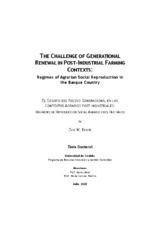The challenge of generational renewal in post-industrial farming contexts: regimes of agrarian social reproduction in the Basque Country
El desafío del relevo generacional en los contextos agrarios post-industriales: regímenes de reproducción social agrario en el País Vasco
Autor
Brent, Zoe W.
Director/es
Arsel, MuratCuéllar Padilla, María del Carmen
Editor
Universidad de Córdoba, UCOPressFecha
2022Materia
FarmingGenerational renewal
Social reproduction
Agrarian social reproduction
Agrarian welfare
Agroecofeminism
Agroecology
Basque Country (Spain)
METS:
Mostrar el registro METSPREMIS:
Mostrar el registro PREMISMetadatos
Mostrar el registro completo del ítemResumen
In much of the global North, the continued decline in agrarian jobs and depopulation of rural areas is increasingly discussed by policymakers, and the media as a crisis of generational renewal, which affects the majority of the European region (especially the west) and also the future of the food system. I suggest that this crisis of generational renewal is actually a symptom of broader ecological and political crises, as well as a crisis of social reproduction. Emerging efforts to overcome barriers to generational renewal are framed as one among many collective mobilizations responding to ecological, political and social crises more broadly. We are living in a global moment when the need for systemic transformation in order to ensure the survival of the planet and the majority of the people living on it in increasingly evident. However, the analytical tools historically used to understand these efforts for social change suffer from some shortcomings, limit our view of political subjectivity and even can exacerbate instead of bridge divides between potential revolutionary subjects. These divides have backgrounded rural struggles, women’s, racial justice and environmental movements, as distinct and separate from what Marxists have traditionally seen as the central force of revolutionary power: the urban proletariat, often represented as a white male union worker in the global North. I argue that it is precisely in those overlooked corners, and among what Nancy Fraser calls “capital’s others,” where crucial insights can be gleaned to help sharpen the analytical lens with which we look at social change in the 21st century. Social reproduction theory offers a way to see the structural role of the “forces of reproduction” (Barca 2020), as well as unpacking and broadening the scope to capture the different kinds of labour that contribute to expanded class struggle (Bhattacharya 2017). I draw on insights from the Basque Country to highlight the work of agroecological farmers, women and racialized people in rural areas of the Global North dedicated to sustaining life. There, the collective and individual struggles of farmers attempting to curb the crisis of generational renewal can be understood as a window into the current phase of capitalism and the broader politics of rural resistance that are emerging in response. In order to explore these emerging agrarian political subjectivities, I develop an analytical framework to explore what I am calling, regimes of agrarian social reproduction. Such regimes can be looked at historically as institutionalized modes of reproducing the conditions necessary for agrarian production in rural areas and reveals how patterns of social reproduction are contested, undermined and change over time and in context. These regimes are made up of three dimensions: 1.) Generational reproduction: The work of birthing, caring for and attending to the biological and physical needs of the next generation of workers as well as the intergenerational relations that support this process. 2.) Collective reproduction: the work that goes into reproducing a collective identity, culture and social norms as well as the construction of the ‘other’. 3.) Systemic reproduction: the relationship between social reproductive work and productive relations, which reproduces the broader socio-economic system. Using this analytical framework means expanding where we look and how we see politics and struggle taking place, and highlights the political subject as a social being first, and then a worker. It sees work as something that takes place inside and outside of the formal economy, and that serves a variety of purposes. This expanded conception of working class helps see how for some withholding of one’s labour power (a classic strike) is the strategy for contributing to social transformation. But for others, like Basque agroecofeminists, their strategic power is less about the ability to disrupt, and more about the ability to keep us alive, by feeding, caring and regenerating rural environments, in ways that are as unproductive to capital as possible and in solidarity with other workers.

